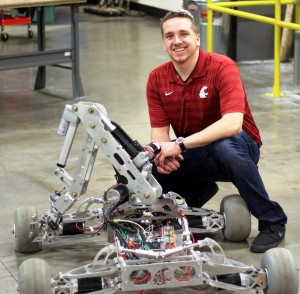For 13 months, Engineering Club students at Washington State University Everett have spent countless hours designing, building, testing and rebuilding a Mars rover meant to be able to work alongside human explorers on the surface of the Red Planet.
This week, representatives of the University Rover Challenge announced in a video that the WSU team is one of 30 advancing to the semifinal round of the competition, which will take place June 2-4 at the Mars Society’s Mars Desert Research Station in southern Utah.
“I still remember when we did our first design of the chassis on a blank piece of paper in February 2015,” said Blaine Liukko, 24, a mechanical engineering senior from Lynnwood.
In December 2015, a record 63 teams from 12 countries embarked on a mission to design and build the world’s best Mars rover. The 30 semifinalists represent seven countries, including the United States, Bangladesh, Canada, Egypt, India, Poland and South Korea.
The 20-member WSU Everett club is in its second year of existence – a newborn in comparison to some of the teams in the competition, and much smaller.
“When I revealed the news to the team that we were accepted into the competition from the pool of more than 60 other teams, they were ecstatic,” said Liukko, who is president of the club. “Now we are counting down the days until June 2.”
Preparing for Utah
According to the University Rover Challenge website, on the first day teams will race for the fastest time in a “short course” event that tests rover maneuverability and dexterity and team scientific knowledge.
The top 15 teams will advance to the Ares Finals and compete in a variety of tasks for the top spot. The remaining teams will advance to the Phobos Finals competition.
The WSU Everett team is working hard to prepare.
“Our chassis and arm are mostly complete,” Liukko said. “The first chassis was made of aluminum, which was about 30 pounds heavier than the new carbon fiber one.
“We plan on testing at our five-acre test track in Arlington within the next couple of weeks, simulating the competition as closely as possible,” he said. “That testing will tell us a lot about how we will be able to perform, while giving us plenty of time to make revisions before the competition, if needed.
“Being able to apply what we have learned to a real-life project and see our designs come to reality gives us experience that few engineering students obtain through their education,” he said. “We hope to show off our engineering skills and make all generations of Cougars proud.”
An investment by the community
Designing and building the Mars rover was expensive and requires some very specific materials. But local industries and the Cougar Nation have been generous.
“It was great to get support from companies like Boeing and Janicki Industries, particularly because some of our team members can and will work there after graduating,” said Liukko.
Boeing and Janicki both donated carbon fiber. Everett Steel, Metal Supermarkets and Protocase provided aluminum, brass and stainless steel. To power the rover, Pacific Power Batteries donated a 4.5 pound lithium iron phosphate battery. And Dassault Systemes gave the team software licenses so students could design the rover.
The team also received start-up contributions from the WSU Foundation, Voiland College of Engineering and Architecture and the Bruce and Barbara Wollstein Endowment in Engineering.
The long road to Mars
Before they can compete, the students need to get to Utah, which will require more funding – about $4,000 for additional parts, travel and lodging, Liukko estimated. The club is accepting donations through the WSU Foundation
During the critical design review process a panel of judges reviewed technical reports and video submissions from each of the teams. Watch the WSU Everett Engineering Club submission at https://vimeo.com/157810811.
“The team has put hundreds of hours into the design, testing and manufacturing of this rover, and the fact that we know now that we will compete against 29 other universities from seven different countries is a tremendous honor,” Liukko said.





March 23, 2016
Everett, Everett Schools